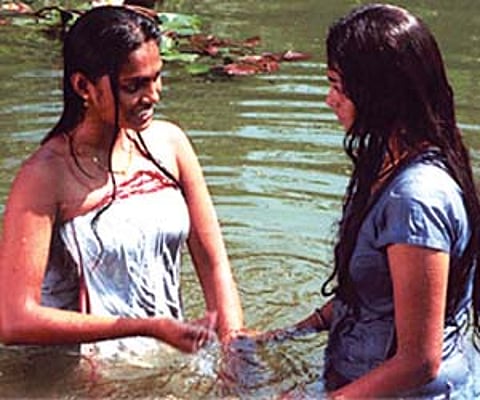

Sancharam (The Journey) traces the growing into maturity of two friends, Kiran (Suhasini V Nair) and Delilah (Shrruiti Menon), and their passionate love for each other, that challenges the norms of society, such as the family, heterosexual marriage and religion. The lovers are separated and are forced to conform to the rigid norms of middle-class morality. They face opposition and ridicule from parents, friends and teachers.
The 2004 movie ends ambiguously with Delilah running out of the church from her marriage ceremony and Kiran deciding against suicide and embarking on a new journey, with her long hair cut and thrown in the river. The movie, by not ending with a joint suicide, offers an affirmative picture. There’s hope for lesbian women, it seems to say.
Desadanakkili Karayarilla (The Migratory Bird Never Cries), in 1986, was not vocal about its portrayal of lesbian relationships, but hinted at it through the story of inexplicable love between two girls, Sally (Shari) and the meek and tradition-bound Nirmala (Karthika). The two girls run away during a school trip in order to punish their teacher Devika (Urvashi) who organised the trip. Their journey is soon interrupted by a man, Harisankar (Mohanlal), who mysteriously befriends the girls and begins a romantic relationship with Nirmala. Sally strongly objects to this relationship and warns her friend against the suspicious nature of the man. Nirmala, who was almost convinced to leave everything behind to be with the man she loves, gets a shock when she finds out that the man was actually in love with the teacher whom she despised and ran away from. Unable to find a way out of the misery that befalls them, Sally and Nirmala cling on to each other and commit suicide by consuming poison.
P Padmarajan’s Desadanakkili Karayarilla and Ligy J Pullappally’s Sancharam, released two decades later in 2004, reflect the slow, painful and far-from-over social revolution in Kerala for women who love women.
Sancharam questions the rhetoric of heterosexuality as “natural” and hence legal by highlighting two aspects in the film: setting the love between the two women in a rural, Edenic environment, positing homosexuality as an equally “natural” way of love as heterosexuality, and by incorporating and displacing heterosexual love.
Rajan, the girls’ classmate falls in love with Delilah, but she chooses to be with Kiran. The second aspect hints at the fact that it was not the failure in heterosexual relationships that made the lovers turn to each other. It is, in fact, through these two aspects of the film that the director implicitly marks her dissatisfaction with the depiction of homosexuality in the critically acclaimed film Fire, which was directed by Deepa Mehta, and released in 1996.
In Desadanakkili, there is a tendency to imitate the man-woman relationship by projecting one of the lesbian couple as masculine and the other as extremely feminine. Sally cuts her hair and starts wearing shirts and pants more often, whereas Nirmala is mostly in churidhar or sari.
In Sancharam, there is no such obvious playing out of man-woman relations, but nonetheless it is there. Kiran does not wear earrings until Delilah forces her to do so by piercing her ears. Also, in the end, Kiran cuts her hair and walks away from her decision to commit suicide.
In both films, women are instrumental in disrupting homosexual love. In Sancharam, it is Delilah’s mother (KPAC Lalitha), who separates the lovers by locking Delilah in her room and forcing her into a marriage, whereas, in Desadanakkili, it is the female teacher who obstinately tries to make the girls conform to the rules of the school but in both films, the girls rebel.
In Desadanakkili, both the girls are shown as coming from broken family backgrounds. The parents are either divorced or one of them is dead. Sancharam, on the other hand, shows the women coming from two perfectly healthy families.
In steps and starts, going backward and forward, these two films graph the difficult path it has been, and continues to be, for women who love women in Kerala.
renueliza@gmail.com